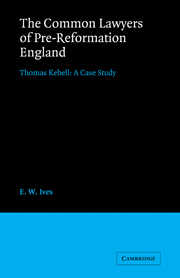Book contents
- Frontmatter
- Contents
- List of figures and tables
- Preface
- Abbreviations
- Manuscript sources
- Table of cases
- Introduction
- PART I THE LEGAL PROFESSION
- PART II LEGAL PRACTICE
- PART III THE LAWYERS AND THE LAW
- PART IV THE PROFESSION AND SOCIETY
- 13 The rewards of the profession: fees and payments
- 14 The rewards of the profession: income and morality
- 15 The rewards of the profession: the estates of Thomas Kebell
- 16 The rewards of the profession: Humberstone Manor
- 17 Social mobility: the Kebells of Humberstone
- 18 Thomas Kebell and the pre-Reformation legal profession
- Retrospect
- Appendices
- Index
13 - The rewards of the profession: fees and payments
Published online by Cambridge University Press: 05 November 2011
- Frontmatter
- Contents
- List of figures and tables
- Preface
- Abbreviations
- Manuscript sources
- Table of cases
- Introduction
- PART I THE LEGAL PROFESSION
- PART II LEGAL PRACTICE
- PART III THE LAWYERS AND THE LAW
- PART IV THE PROFESSION AND SOCIETY
- 13 The rewards of the profession: fees and payments
- 14 The rewards of the profession: income and morality
- 15 The rewards of the profession: the estates of Thomas Kebell
- 16 The rewards of the profession: Humberstone Manor
- 17 Social mobility: the Kebells of Humberstone
- 18 Thomas Kebell and the pre-Reformation legal profession
- Retrospect
- Appendices
- Index
Summary
Chaucer's ‘Man of Law’ begins his ‘tale’ with a diatribe against the ‘hateful harm’ of poverty, an opening entirely in character with a serjeant-at-law who:
For his science and for his heigh renoun
Of fees and robes hadde he many oon.
So great a purchasour was no-wher noon.
Al was fee simple to him in effect, His purchasing mighte nat been infect.
The audience would have caught the allusion at once; wealth was the goal of the lawyer, the measure of success. It would have enjoyed, also, the Serjeant's praise of wealthy merchants:
O riche marchaunts, ful of wele ben ye,
O noble, o prudent folk, as in this cas!
Your bagges been nat filled with ambes as [a
pair of aces],
But with sis cink [a six-five], that renneth
for your chaunce;
At Cristemasse merie may ye daunce …
This identification of the law and wealth is universally made, and generally in terms less urbane than Chaucer's. The besetting sin, almost the trade-mark of the lawyers, is avarice. Refusing to share knowledge except for money appears a simple lack of charity, and the esoteric language and exclusiveness of the profession seem a conspiracy to fleece the layman. In medieval England this was a stock theme of the moralist, increasingly heard as lawyers became better organised and more influential. When Thomas Kebell joined the profession, the anonymous London Lickpenny was in circulation:
In Westminster I found one
Went in a longe gowne of ray;
I crowched, I kneled before them anon,
‘For Mary's love’, of helpe I gan them pray. […]
- Type
- Chapter
- Information
- The Common Lawyers of Pre-Reformation EnglandThomas Kebell: A Case Study, pp. 285 - 307Publisher: Cambridge University PressPrint publication year: 1983



